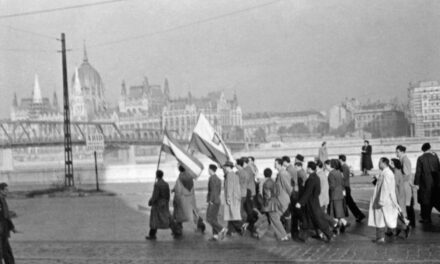It will be about him. And about Endre Ady. This obviously seems surreal at first, but they will soon understand. Because yes, there are similarities - and of course differences. Written by Zsolt Bayer.
Let's take a look at the similarities first.
Endre Ady did not like Prime Minister Count István Tisza, and in this case we were as cautious as possible. Ady's feelings about Tisza are perhaps quite plastically summed up by the publicist articles he wrote about the prime minister and their rococo opulence. A small, colorful bouquet, for a taste:
"Old gesticulating fool"; "Napoleon gestures"; "arsonist, swaggering person"; "Erzsébet kan Báthori"; "Kayan with rotten eyes and rotten head"; "God of Bihar"; "rogue".
Suddenly I managed to collect that much. And of course, Ady wouldn't be Ady if he hadn't spread his sick, unreasonable and unjustified hatred to all those who dared to talk to Tisza, the Hungarian Prime Minister. It is perhaps not uninteresting to recall here that after the assassination of Ferenc Ferdinand, István Tisza, the Hungarian Prime Minister, was the only one in the entire Monarchy, the Crown Council, who stubbornly opposed the declaration of war and the war.
"We all agree that the Monarchy that we also control, of which we are one of the decisive factors, - that this monarchy must serve the principles of peace and the status quo in foreign policy: that the monarchy does not have conquering goals, ambitious goals and that it must seek its historical vocation, its legitimate ambition, the moral source of its right to exist in this exposed part of Europe, as soon as it defends its independence, at the same time it becomes a bulwark, a sure support and an ally for the free further development of the small peoples living around it" - he said, adding his famous phrase:
"In this war we can win nothing, but we can lose everything".
This István Tisza was considered by Ady to be a "murderer" even before the outbreak of the war (!) and when one of his best friends, Octavian Goga, negotiated with the Hungarian Prime Minister within the framework of the Romanian National Committee, Ady wrote to him:
"A poet can kill if he loves, but he doesn't make friends with murderers... [...] They made an agreement with someone who now lives the life of the German robber barons and the Németújvárs, Máték Csák, the old Transylvanian lords, who hunted the Romanian serfs and all kinds of serfs like they hunt foxes today . They agreed with someone whose nervous system quality and age is a thousand years ago, and, entangled with the inevitable times, shows a truly comical degeneration."
And then, after all this, let's also look at the letter he wrote to Tisza Ady when he was preparing to go to Paris and needed some money - here it is:
“My lord! Please forgive me for bothering you with another letter. I want to bring to your Grace's memory my request, with which I dared to appear before your Grace on two occasions. Since then - two months have already passed - I have been living and studying in Paris. [...] If you remember, my Lord, I had the courage to ask [...] to get some financial help for my studies in Paris. […] To my gracious Lord, who was so graciously and warmly received, I offer my request to his kindness and goodness: Endre Ady.”
And Tisza only noted this:
"I remember well how Ady scolded the Tiszas when he was courting Dezső Lóránt, but I am not vindictive. What an antique character! Isn't it?”
After all this, let's turn to Ferike Gelencsér.
Named instant - what else? -, a completely negligible entity, wrote a respectful letter to the Hungarian embassy in Germany, in which he asked for accommodation, saying that he would spend these days there. And Ferike Gelencsér, as a member of parliament, is forced to spend his days in such difficult financial circumstances that he cannot afford to pay for a room in a Berlin motel, so he respectfully asks for the help of the embassy - that is, the Hungarian state - so that he is not accidentally forced to take the tube at the train station.
And our embassy in Berlin accommodated the representative "gentleman" in the most elegant, beautiful and frequented place of the city, at the Brandenburg Gate.
Then, after Ferike Gelencsér moved into the accommodation provided by the embassy, our embassy received an official notification from the German police that on March 15 Ferike Gelencsér and his colleagues will hold a demonstration in front of the Hungarian embassy against the intolerable dictatorship in Hungary.
What an antique character this Gelencsér is, isn't it?
Just like Ady.
But - and we're going to point this out! – Ady, who was never a moral athlete, in fact, was just a genius, one of the giants of Hungarian poetry, who wrote, among many other things, The Cross of Christ in the Forest, The Carriage Road in the Night, The Fight with the Lord, The Pardoner , nice message, the poems A Magyar Ugaron and Az ős Kaján.
And if these poems were not there, we would be immeasurably and immeasurably poorer.
On the other hand, the masterpiece of Ferike Gelencsér's life is his parliamentary speech, which he himself described as follows: "I was going to miss this, wasn't I?"
The question is painful: would we be poorer without Ferike Gelencsér?
In any case, quoting State Secretary for Foreign Affairs Tamás Menczer, we wish Ferike Gelencsér the best of luck with the demonstration, we hope that he will thoroughly express his opinion about this terrible dictatorship of ours, and then he will be contentedly sipping the dictatorship's coffee in the dictatorship's guest house, and maybe spend a few more days there, the dictatorship under his dunya, to rest the fight against the dictatorship.
"How stupid the dwarves are," wrote Ady. And although he didn't know, he was talking about Ferike Gelencsér. About the antique character…
Featured Image: Facebook












